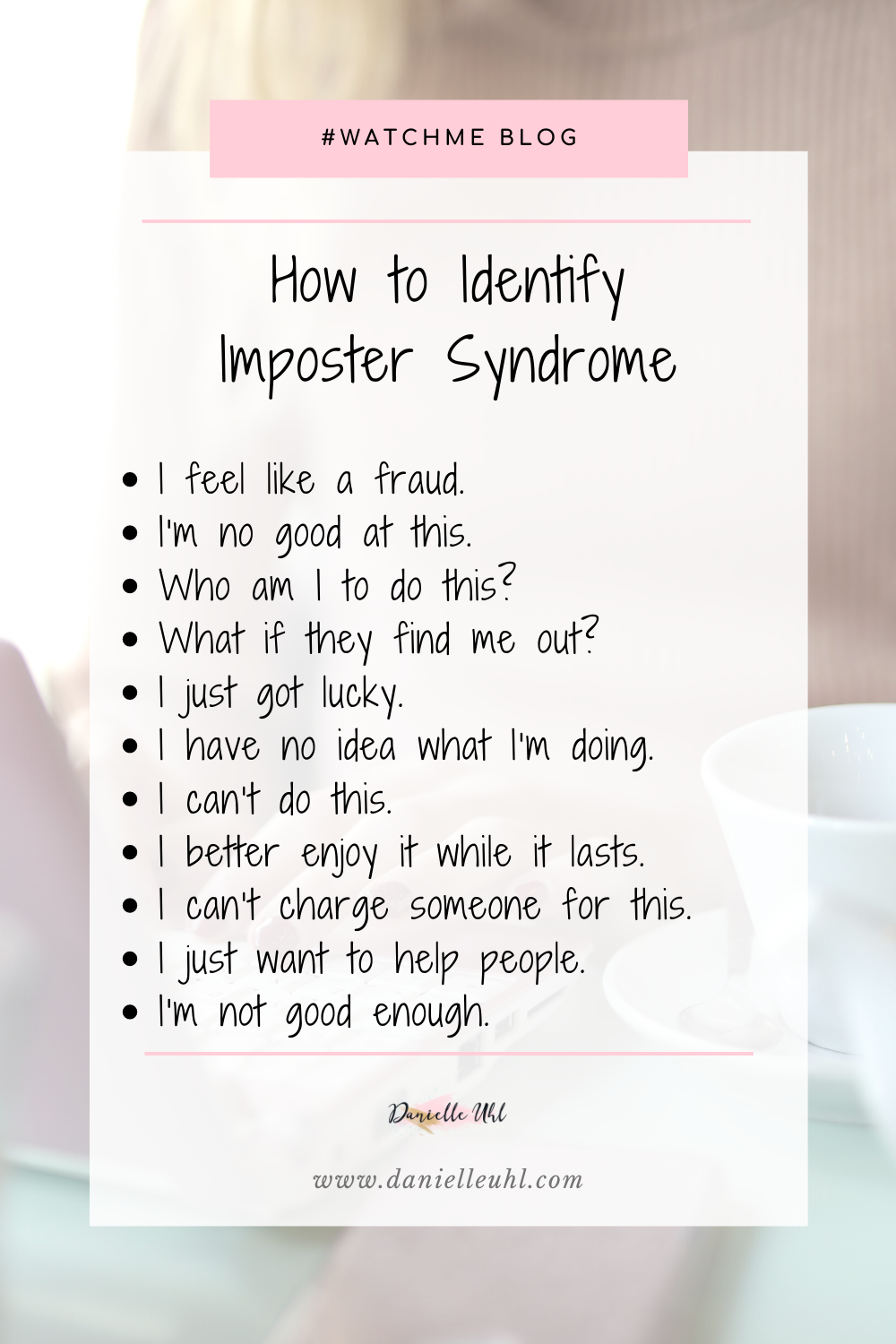If you’re here reading this right now, I want you to know, don’t worry — how you’re feeling is totally NORMAL and I hear you.
Imposter syndrome (or phenomenon) is known as a “psychological pattern in which a person doubts their accomplishments and has a persistent internalized fear of being exposed as a ‘fraud’” (Pauline Clance & Suzanne Imes, 1978).
We’ve all had those moments or even reoccurring thought patterns of the gremlin in your mind telling you all sorts of nonsense. Every single business owner and client I’ve talked with has these thoughts and feelings surface from time to time.
Identifying Imposter Syndrome
Imposter Syndrome is not always an easy thing to identify.
Sure, sometimes you find yourself blatantly thinking, “I feel like a fraud” or “I don’t feel good enough to do this…” That’s the gremlin talking nonsense again.
But sometimes those thoughts feel so real.
How to Identify the Gremlin:
- I feel like a fraud.
- I’m no good at this.
- Who am I to do this?
- What if they find me out?
- I just got lucky.
- I have no idea what I’m doing.
- I can’t do this.
- I better enjoy it while it lasts.
- I can’t charge someone for this (yet).
- I just want to help people. [When it comes to pricing & money]
- I’m not good enough.
If you’re reading these and thinking… OMG, that’s me! You are absolutely in the right place.

Your Permission Slip
Again, Imposter Syndrome is normal and happens to everyone. An article from Entrepreneur Magazine shares this perspective from well-known names that you’d never guess struggle with Imposter Syndrome as well.
The article included quotes from the following:
Lady Gaga: “I still sometimes feel like a loser kid in high school and I just have to pick myself up and tell myself that I’m a superstar every morning so that I can get through this day and be for my fans what they need for me to be.”
Tom Hanks: “No matter what we’ve done, there comes a point where you think, ‘How did I get here? When are they going to discover that I am, in fact, a fraud and take everything away from me?’”
Maya Angelou: After publishing her 11th book, and every time she wrote another one she’d think to herself: “Uh-oh, they’re going to find out now. I’ve run a game on everybody.”
David Bowie: “I had enormous self-image problems and very low self-esteem, which I hid behind obsessive writing and performing. … I was driven to get through life very quickly. I really felt so utterly inadequate. I thought the work was the only thing of value.”
It’s easy to scroll on social media, watch popular movies, read bestselling books, etc. and get stuck in our heads with the gremlins. But once you know how so many of these successful names still, even today, still struggle with thoughts of Imposter Syndrome, you feel more capable of overcoming it.

7 Steps to Overcome Imposter Syndrome
1. Identify & Acknowledge
Get out a sheet of paper or journal. The first step is to identify the specific thought or belief — what is the gremlin telling you? Write it down on paper and acknowledge it. Pushing it back down and pretending it isn’t there or doing the tasks any way isn’t going to help it go away, and might even make matters worse. Don’t just fake it until you make it. Get really clear what the Imposter Syndrome is telling you so you can work through it to change it.
2. Question the Validity
Once you identify the specific thought or belief, put it under investigation — Is this actually true? Just because a thought pops in your head, and even if it comes up again and again bullying you into believing it, doesn’t mean it’s true. Beliefs are just patterns of having the same thought over and over again. Our brain works to find examples and experiences as evidence that these thoughts are true, forming the neural pathway that creates a belief. Again, it doesn’t mean these are actually true. It just means we’ve created the belief that they are.
3. Create a Master Accomplishments List
It’s so easy for our brains to focus on any little thing that goes wrong and quickly forget all of the hundreds of thousands of things we’ve already accomplished. Next, sit down and create a master list of all of the things you can think of that you’ve accomplished this far in life. Any time you feel Imposter Syndrome creep up, go to this list and remind yourself of all the successes and accomplishments you’ve had — immediate confidence booster!
Get out a sheet of paper or open up a Google doc and start making your list. Think through every year, each hobby, school, job, business, family, all areas of your life and list out your accomplishments, successes, and celebrations. Save this somewhere where you can regularly go back and continue to add to it. You never know when you will need it.
4. Reframe
Now that you have this master list of PROOF you are a freaking Badass, it’s time to go back to that old belief. How can you reframe this belief in a positive way that better serves you?
Examples:
I feel like a fraud. —- to —- I’m not a fraud because… (list reasons from list).
I just got lucky. —- to —- I am worthy of my success because…
I just want to help people. —- to —- I can help people AND charge because…
5. Be Gentle with Yourself
Let’s be real for a minute… Imposter Syndrome is a Bitch. There’s no quick-fix — it will come up for you time and time again. Overcoming it is a process. Don’t forget to be gentle with yourself. As you work through this, know that you are consciously shifting your mindset and taking action to change your thinking. The more you take care of you in the process, the more confidence and trust you will build with yourself along the way to overcome these thoughts and beliefs.
6. Support System
One of the quickest ways to any success is to surround yourself with people who inspire, mentor, and support you. This process is no different. Work to find a support system with a few people you can go to when the gremlins return. Ask them to listen, help remind you of your accomplishments, and push you to keep moving forward.
7. Get Uncomfortable
The biggest way Imposter Syndrome can get the best of you is when you allow the gremlins to scare you to a grinding halt. Instead, it’s time to get really uncomfortable. Yes, the gremlins are going to continue telling you nonsense. Yes, you may physically feel anxious or tense to take the very next step forward. But, it will be worth it.
Start with one of the following:
- Make the best step-by-step list you can for the project or goal at hand. Then, stop thinking about ALL of the things and instead, simply focus on the very next step. Then the next.
Remember: How do you eat an elephant? One bite at a time. - Challenge yourself to try new things you’ve never done before. Go to a movie by yourself. Try something new off the menu at a new restaurant. Take dance lessons. Go bungee jumping. Whatever you can think of, just get uncomfortable and try something new.
Every time you try something new, even if you decide you don’t like it, the point is you did it. You build immediate confidence and trust with yourself that proves to the gremlins that you are capable of doing incredible things.


